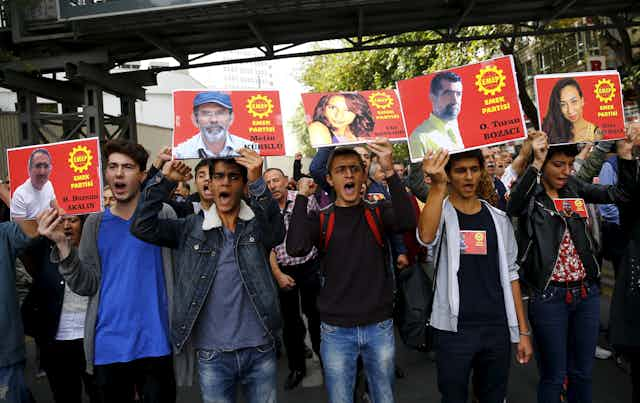Turkish prime minister Ahmet Davutoglu has said that whoever was behind the carnage at a peace rally in Ankara on October 10 was trying to influence the general election to be held in Turkey on November 1. He was right. The question though is who they are.
It could be the Marxists, Islamists or Islamic State itself. It could be the Kemalist nationalists or the more rabid Grey Wolves pan-Turkic nationalist group. It could even be the Turkish security services.
It is symptomatic of the polarisation and volatility of Turkish politics that most of these options are plausible. Smoke and mirrors abound. Things are rarely what they seem and some of the conspiracy theories might just be true, even if they seem implausible to people outside the country.
Let’s look at the background to the bombing. The attack took place at a rally ahead of the election on November 1 – the second national election this year. The first vote took place in June and failed to produce a result. It became clear that the ruling AKP party had lost significant support while the moderate leftist People’s Democratic Party (HDP) and its charismatic co-leader Selahattin Demirtas had attracted an increased number of votes.
The HDP has grown out of the Kurdish movement and is associated with it but, significantly, had begun to appeal to moderate social democrats across the board. This enabled it to win more than 13% of the vote in June, securing 80 parliamentary seats for the party.
It was enough to stop the AKP forming a majority government and forced it into coalition talks instead. The result also stopped plans by president Recep Tayyip Erdoğan – who is an AKP stalwart – to convert his position into an executive presidency, which would bestow on him many of the parliament’s powers.
Ever since the June elections, the longstanding tension between the Kurds and wider Turkish politics has resurfaced. The PKK Kurdish paramilitary organisation has stepped up its attacks on police and military personnel.

At the same time, the Turkish government has targeted the PKK and its allies fighting IS in Syria and Iraq. There was already a widespread belief that the Turks worked with IS against the Kurds during the battle for Kobani and suspicions were soon aroused when a Kurdish rally in Diyarbakir was attacked just before the June election.
Further links were made when another meeting in Suruc, near the Syrian border, was bombed in July. While IS was blamed, many Kurds believe the attack was somehow carried out with the collusion of the Turkish security service.
All this has led to a resurgence of effective civil war between the Turkish state and its Kurdish minority. The HDP is caught in the middle, trying to broker peace and watching its wider electoral credibility drain away.
The build up to November 1 was always going to be fraught, but the death toll in Ankara is truly shocking.
An election ahead
It is clear that whoever planned Saturday’s attack was trying to affect the HDP’s chances but that goal could be attributed to various culprits. Really, the only scenarios that can be completely ruled out is that it was the PKK working in league with IS or the HDP trying to garner sympathy by attacking its own supporters. Both have been suggested by AKP ministers and both have been rightly condemned as ridiculous.
A more likely explanation is that the perpetrators were Islamist operatives of some kind – be they homegrown or from IS. What is not so clear is the extent to which the AKP was involved, if it was at all. Some believe AKP allies within the security service have been using IS operatives to do their dirty work in order to consolidate Erdoğan’s grip on power.
Still more people believe that even if the AKP wasn’t directly involved, it certainly didn’t try to avert this tragedy. They see Erdoğan’s divisive rhetorical style as inadvertently encouraging extremist factions to act, even if there was no direct collusion.
Either way, the HDP has announced that it will not hold any more rallies ahead of the election because it is too risky for its supporters to attend. And if it wants to make campaigning even harder for the opposition, the AKP could easily capitalise on the current mood to present itself as the party of security and stability. Turkish voters are, after all, extremely afraid of returning to the bloody anarchy of the 1970s.
But there is an alternative scenario. It is possible that the Ankara bomb was a turning point. Reports of bewildered survivors being tear gassed by Turkish police has unsettled many moderate Turks. Maybe they will now start to question the AKP’s version of events. Even if they don’t, they are aware that if the AKP wins a majority in November it is only a matter of time before Erdoğan installs himself as the executive president.
Perhaps the tide will turn back in favour of the HDP and its support will hold on November 1. If that happens, Erdoğan’s personal power crusade will be stymied once again. Unfortunately that could be the most dangerous outcome of all.

